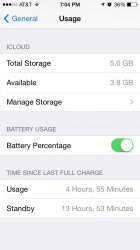Because the Galaxy line is too much "specs for specs sake": too much marketing fluff and half-baked features that sound better than they are.
iOS delivers:
* OS updates well into the future, available promptly. Not devices abandoned while you're still paying the contract.
* 100% FULL automatic backups so that your next iPhone or your warranty swap automatically clone every setting and customization right down to your wallpaper, app folders, and half-typed email drafts.
* Far better security and freedom from keyloggers and malware. (Even the official Google Play store has fake versions of name-brand apps using a realistic name and icon.) Privacy and security are much higher priorites for Apple than for Google--as Google fully admits.
* MUCH better selection of QUALITY apps, and iOS usually gets developers' attention first (for reasons which are not going away). Android can say "we have something in that general category" a lot more often than they can say "we have an app that's truly as good." And what exclusives do they have? Widgets and system hacks. That's neat (albeit insecure unlike what iOS 8 is doing along those lines). But iOS has REAL app exclusives. Awesome ones.
* Battery life that doesn't shrink just from installing a ton of apps. You don't have to manage apps like you're on a 1990 Windows PC.
* Really solid (usually metal) construction. Today's Samsung's feel cheap, like a lesser imitation of Apple's plastic construction from years ago.
* Speed and efficiency: Android throws power-hungry cores at the performance problem, treating it as a marketing matter because it's all they can do. Meanwhile, all those cores fall short in real-world speed tests, and Apple delivers 64-bit... and truly supported by apps, delivering real benefits.
* iOS has software, hardware, processor, dev tools and online store all designed together as whole, by one company that puts the customer first. Android has multiple different competing parties with incompatible goals, very often putting advertisers (Google) and carriers (Samsung) first. Great example: Samsing adds neat-sounding features that make nice ads. How widely are they supported by actual apps? Quite poorly. Samsung doesn't control the OS or the dev tools. In fact, Google wants them NOT to customize Android. Who wins that fight? Not users.
Android IS a good choice for some people. It delivers:
* More system hacks available. (But you can't hack it to correct the problems above.) The teenage Amiga hacker in me wants a hand-me-down Android handset to mess with.
* Custom keyboards and widgets. (iPhone won't get those for a few months--but when we do, they'll be secure in ways Google isn't even approaching.)
* Larger-screen options (but poor options for one-handed sizes; they tend to be slow and low-spec). iPhone, again, won't get those for a few months. And may never reach 5" if that's important enough to accept the Android problems.
* The option to carry extra batteries. Wait, there are tons of those for iPhone. Never mind.


